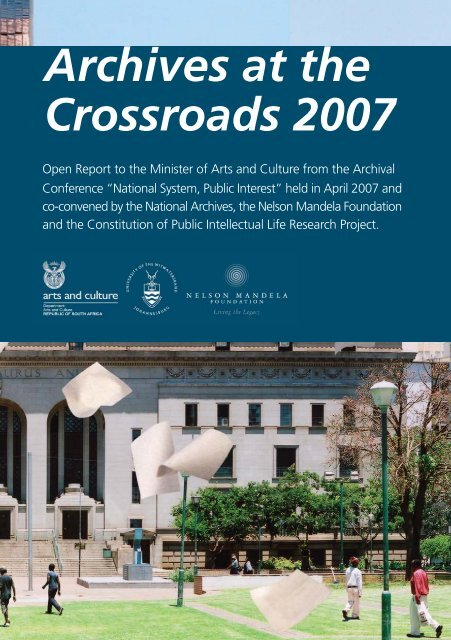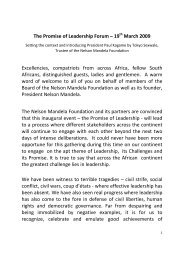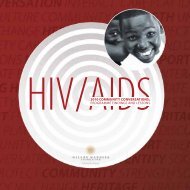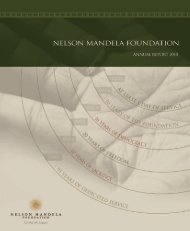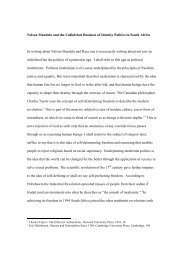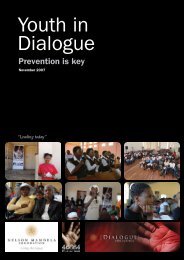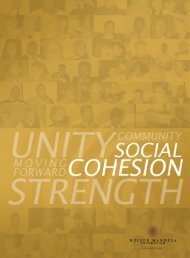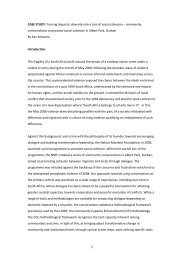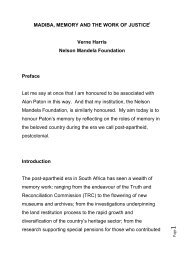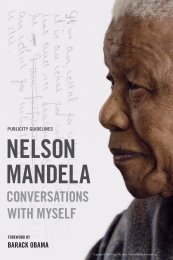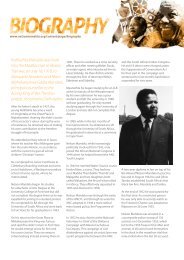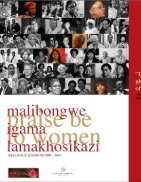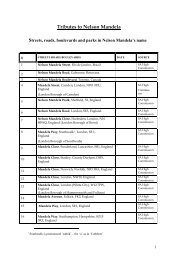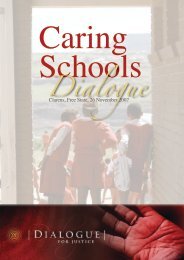Archives at the Crossroads 2007 - Nelson Mandela Foundation
Archives at the Crossroads 2007 - Nelson Mandela Foundation
Archives at the Crossroads 2007 - Nelson Mandela Foundation
- No tags were found...
Create successful ePaper yourself
Turn your PDF publications into a flip-book with our unique Google optimized e-Paper software.
<strong>Archives</strong> <strong>at</strong> <strong>the</strong><strong>Crossroads</strong> <strong>2007</strong>Open Report to <strong>the</strong> Minister of Arts and Culture from <strong>the</strong> ArchivalConference “N<strong>at</strong>ional System, Public Interest” held in April <strong>2007</strong> andco-convened by <strong>the</strong> N<strong>at</strong>ional <strong>Archives</strong>, <strong>the</strong> <strong>Nelson</strong> <strong>Mandela</strong> Found<strong>at</strong>ionand <strong>the</strong> Constitution of Public Intellectual Life Research Project.
<strong>Archives</strong> <strong>at</strong> <strong>the</strong><strong>Crossroads</strong> <strong>2007</strong>
ContentsSummary ........................................................................ 1Background ........................................................................ 2Conference Overview and Objectives ................................. 3The Role of Records and <strong>Archives</strong> in a Democracy .................... 4Lack of Access to <strong>the</strong> Archive .............................................. 5Valorised Heritage and Neglected Archive ................................. 8Isol<strong>at</strong>ion of Archive ........................................................... 9P<strong>at</strong>chy and Failing Archival Services ................................. 10The Digital Future ........................................................... 12N<strong>at</strong>ional <strong>Archives</strong> Advisory Council ................................. 12Conclusion ........................................................................ 13Appendix 1Conference Programme ........................................................... 19Appendix 2Working Session Participants .............................................. 21Appendix 3Attendance Register ........................................................... 21Appendix 4Regional Archival Pl<strong>at</strong>form Proposal Summary .................... 28
Sarah Tyacke, University of London, gives <strong>the</strong> keynote addressEllen Namhila speaks from <strong>the</strong> floor
SummaryThe triggers th<strong>at</strong> led to <strong>the</strong> holding of <strong>the</strong> Conference, various contributionsto <strong>the</strong> Conference, and <strong>the</strong> discussions th<strong>at</strong> ensued, point unambiguouslyto an archival system th<strong>at</strong> is under severe strain and to a wider archivesector urgently in need of support.The problems lie in three areas:The political and social role of archive and archiving in a democracyand in facilit<strong>at</strong>ing <strong>the</strong> work of building social cohesion in a diverse andhistorically-fractured society is still not recognized sufficiently, nor is it activelyand system<strong>at</strong>ically fostered in and by government and indeed, in <strong>the</strong> broaderpublic sphere. Fur<strong>the</strong>rmore, many of <strong>the</strong> varied forms and sites of archiveand archiving go unrecognized.Archival work is seriously under-resourced because its significanceis largely unacknowledged.Lack of recognition and under-resourcing result in inadequ<strong>at</strong>e andunintegr<strong>at</strong>ed planning; a low skills-base among personnel; inadequ<strong>at</strong>e recordsmanagement in government departments; absence of clear career-p<strong>at</strong>hs forstaff; poor service delivery; inadequ<strong>at</strong>e conditions of preserv<strong>at</strong>ion; in short,an archival system under strain and not serving South Africa as it should.Unless remedial action is taken soon, <strong>the</strong>re is <strong>the</strong> potential for fur<strong>the</strong>rdeterior<strong>at</strong>ion, even collapse.The records of government are a key instrument of efficient administr<strong>at</strong>ionand planning, and <strong>the</strong> means by which citizens hold governments accountableto <strong>the</strong>m. The archive and archiving are fur<strong>the</strong>r central tools of reconcili<strong>at</strong>ionand of <strong>the</strong> recognition of our common humanity embracing all our diversity.They are sites for <strong>the</strong> ongoing reconsider<strong>at</strong>ion of <strong>the</strong> past in order to enablea better future.We are <strong>at</strong> a crossroads. Right now <strong>the</strong>re is a unique opportunity both to fix<strong>the</strong> problems in <strong>the</strong> system and to use a rethought, 21 st century, postcolonialconcept of archive to underpin <strong>the</strong> urgent n<strong>at</strong>ional project of social cohesion.On <strong>the</strong> o<strong>the</strong>r hand, <strong>the</strong>re is a danger of <strong>the</strong> n<strong>at</strong>ional system being reducedto an observer of poor governance and a loss of historical memory. Wh<strong>at</strong> is<strong>at</strong> stake is not simply <strong>the</strong> survival of <strong>the</strong> inherited documents of <strong>the</strong> past, butour hard-won democracy itself and our possible future as a cohesive society.<strong>Archives</strong> <strong>at</strong> <strong>the</strong> <strong>Crossroads</strong> | 1
BackgroundIn response to a range of indic<strong>at</strong>ors signaling a troubled st<strong>at</strong>e of affairs in<strong>the</strong> n<strong>at</strong>ional archival system and in <strong>the</strong> archival sector more broadly, <strong>the</strong>N<strong>at</strong>ional <strong>Archives</strong> and Records Service, <strong>the</strong> <strong>Nelson</strong> <strong>Mandela</strong> Found<strong>at</strong>ion and<strong>the</strong> University of <strong>the</strong> Witw<strong>at</strong>ersrand, with <strong>the</strong> support of <strong>the</strong> Minister of Artsand Culture, collabor<strong>at</strong>ed in organising a two-day conference (23 and 24April <strong>2007</strong>) to assess <strong>the</strong> st<strong>at</strong>e of <strong>the</strong> n<strong>at</strong>ional archival system and <strong>the</strong> vitalityof <strong>the</strong> broader archival sector.By n<strong>at</strong>ional archival system we mean <strong>the</strong> institutional network of st<strong>at</strong>estructures driven by <strong>the</strong> N<strong>at</strong>ional <strong>Archives</strong>, which is charged with <strong>the</strong> tasksof ensuring <strong>the</strong> proper management of public records, promoting <strong>the</strong>preserv<strong>at</strong>ion and accessibility of South Africa’s archival heritage, and overseeing<strong>the</strong> n<strong>at</strong>ional system. The system comprises <strong>the</strong> N<strong>at</strong>ional <strong>Archives</strong>, <strong>the</strong> N<strong>at</strong>ional<strong>Archives</strong> Advisory Council, <strong>the</strong> various provincial archives structures, and arange of rel<strong>at</strong>ed governance structures. In terms of <strong>the</strong> Constitution, archivalresponsibility for records of <strong>the</strong> st<strong>at</strong>e gener<strong>at</strong>ed by structures o<strong>the</strong>r thann<strong>at</strong>ional ones is <strong>the</strong> responsibility of provincial government.The broader archival sector includes a range of heritage institutions, a clutchof museums with significant artifact collections, university archives, priv<strong>at</strong>eand corpor<strong>at</strong>e archives, activist and community archives like <strong>the</strong> Gay andLesbian Archive (GALA), or <strong>the</strong> issue-driven South African History Archive(SAHA) which seeks to ensure open access to archives; a variety of archivaland memory projects locally, regionally and intern<strong>at</strong>ionally such as <strong>the</strong> <strong>Nelson</strong><strong>Mandela</strong> Found<strong>at</strong>ion’s Centre of Memory and Dialogue, <strong>the</strong> Living LandscapeProject th<strong>at</strong> performs <strong>the</strong> archive of Rock Art in a community base, <strong>the</strong> DistrictSix Museum, and <strong>the</strong> Mellon-funded digitiz<strong>at</strong>ion projects DISA and ALUKA.It fur<strong>the</strong>r includes users, cre<strong>at</strong>ors and <strong>the</strong>orists of archive, among <strong>the</strong>mprofessional historians, family history researchers, artists and o<strong>the</strong>r culturalworkers, identity <strong>the</strong>orists, academics and countless o<strong>the</strong>rs.In <strong>the</strong> course of this report we refer to “archives,” “archiving” and “<strong>the</strong>archive.” We use <strong>the</strong> term “archives” to refer to collections or storehouses ofpreserved historical resources, whe<strong>the</strong>r documentary, oral, visual, m<strong>at</strong>erial,virtual or physical. In so doing we deliber<strong>at</strong>ely break from an inherited usageof <strong>the</strong> term “archives” as limited to texts, whe<strong>the</strong>r documentary or oral.“Archiving” refers to a range of dynamic processes including <strong>the</strong> processes bymeans of which some items get preserved and o<strong>the</strong>rs do not, how choices aremade about systems used to preserve items, and <strong>the</strong> ways in which access torecords is determined.2 |“N<strong>at</strong>ional System, Public Interest” Open Report
“The archive” is a conceptual term. It refers to <strong>the</strong> circumscribed body ofknowledge of <strong>the</strong> past th<strong>at</strong> is historically determined as th<strong>at</strong> which is availableto us to draw on when thinking about <strong>the</strong> past.Conference Overview and ObjectivesSouth Africa’s post-apar<strong>the</strong>id n<strong>at</strong>ional archival system was inaugur<strong>at</strong>ed inlaw when <strong>the</strong> N<strong>at</strong>ional <strong>Archives</strong> of South Africa Act came into oper<strong>at</strong>ion inJanuary 1997. The Act was an expression of a transform<strong>at</strong>ion discourse inarchives which had emerged in <strong>the</strong> l<strong>at</strong>e 1980s and g<strong>at</strong>hered momentum in<strong>the</strong> early 1990s. This discourse focused its energies around two primaryimper<strong>at</strong>ives: <strong>the</strong> building of a new n<strong>at</strong>ional archival system for South Africa;and <strong>the</strong> imagining of a post-apar<strong>the</strong>id archive in South Africa. The Conferenceset itself <strong>the</strong> task of assessing how <strong>the</strong> archival landscape has changed inSouth Africa since 1997 by asking, on this <strong>the</strong> tenth anniversary of <strong>the</strong> Act’simplement<strong>at</strong>ion, how well <strong>the</strong> archival system is working. Key questionsconsidered included how transform<strong>at</strong>ion discourse has engaged changingrealities and wh<strong>at</strong> <strong>the</strong> key challenges are currently both in <strong>the</strong> n<strong>at</strong>ional systemand in <strong>the</strong> broader archival sector.The Conference proposed a review which opens to <strong>the</strong> future, and whichfollowed <strong>the</strong> two strands in transform<strong>at</strong>ion discourse identified above –building and imagining. Part 1 of <strong>the</strong> Conference focused on <strong>the</strong> constitutingof a n<strong>at</strong>ional archival system. Part 2 focused on <strong>the</strong> interplay of “n<strong>at</strong>ionalinterest” and “public interest” in <strong>the</strong> constituting of archive. The Conferenceprogramme is <strong>at</strong>tached as Appendix 1.The Conference was held on 23 and 24 April <strong>2007</strong>, and volunteers fromamong <strong>the</strong> participants met again on 25 April to identify <strong>the</strong> key issues forthis report. A list of <strong>the</strong> working session participants is <strong>at</strong>tached as Appendix 2.The organizers sought particip<strong>at</strong>ion from a wide grouping drawn from within<strong>the</strong> archival profession and from archives stakeholders more broadly. 143stakeholders registered and particip<strong>at</strong>ed in <strong>the</strong> Conference proceedings. Of<strong>the</strong>se 24.5% were from n<strong>at</strong>ional government and 13.3% from provincialgovernment. Stakeholders from universities across South Africa, and as farafield as Namibia and London made up 17.5% of <strong>the</strong> total. Activist archivesmade up 9%, while community-based projects, n<strong>at</strong>ional research/humanrights found<strong>at</strong>ions and <strong>the</strong> SABC each made up 6.3%. Museums made up5.5%, and n<strong>at</strong>ional heritage organistions and individual researchers/heritagepractitioners 2.8% each. The corpor<strong>at</strong>e sector made up 2.1% of <strong>the</strong> total,<strong>Archives</strong> <strong>at</strong> <strong>the</strong> <strong>Crossroads</strong> | 3
while <strong>the</strong> Constitutional Court, <strong>the</strong> educ<strong>at</strong>ional/skills development sector (outside<strong>the</strong> universities) and digitis<strong>at</strong>ion projects each made up 0.7%. A full list ofparticipants is <strong>at</strong>tached as Appendix 3.In <strong>the</strong> report th<strong>at</strong> follows we sound a very serious warning regarding archives.We identify key problem areas and <strong>at</strong>tempt to show wh<strong>at</strong> is <strong>at</strong> stake if <strong>the</strong>y arenot addressed. Throughout we seek to identify where <strong>the</strong> Department of Artsand Culture and government need to act and wh<strong>at</strong> needs to be done. We alsoflag areas where archival professionals and archival stakeholders can make acontribution to addressing problems. The Conference supported <strong>the</strong> form<strong>at</strong>ionof an inter-institutional, inter-project, regional Archival Pl<strong>at</strong>form, with a five-yearagenda of promoting interaction amongst <strong>the</strong> Pl<strong>at</strong>form collabor<strong>at</strong>ors gearedtowards responding to <strong>the</strong> issues identified in this report. A summary of <strong>the</strong>draft proposal for <strong>the</strong> form<strong>at</strong>ion of <strong>the</strong> Archival Pl<strong>at</strong>form is <strong>at</strong>tached as Appendix 4.It is important to note th<strong>at</strong> <strong>the</strong> report th<strong>at</strong> follows is not a commissioned researchreport th<strong>at</strong> system<strong>at</strong>ically sets out to deline<strong>at</strong>e <strong>the</strong> archival system and <strong>the</strong>broader archival sector, and all <strong>the</strong> germane legisl<strong>at</strong>ive and policy frameworks.R<strong>at</strong>her it identifies <strong>the</strong> key problems in <strong>the</strong> system and <strong>the</strong> sector, and <strong>the</strong>concerns of <strong>the</strong> personnel and stakeholders who oper<strong>at</strong>e within those frameworks.It does this from <strong>the</strong> position of <strong>the</strong> concerned intellectuals - <strong>the</strong> practitionersand users loc<strong>at</strong>ed throughout <strong>the</strong> system and <strong>the</strong> sector - who confront <strong>the</strong>seproblems in <strong>the</strong>ir daily practice and who recognize <strong>the</strong>ir implic<strong>at</strong>ions, bothimmedi<strong>at</strong>e and long-term.The Role of Records and <strong>Archives</strong> in a DemocracyIt is a fundamental tenet of democracy th<strong>at</strong> government must be accountableto <strong>the</strong> elector<strong>at</strong>e. Records management and archiving are key tools in fulfillingthis responsibility. But records management is not only about holding governmentaccountable. It is of direct benefit to government in <strong>the</strong> efficient conduct of itsday-to-day business, and underpins planning and <strong>the</strong> development of policies.However, <strong>the</strong> Conference noted a failure in <strong>the</strong> culture of government to prioritiserecord-keeping and archives. The sad fact is th<strong>at</strong> participant after participantreported th<strong>at</strong> registries are typically regarded as dumping grounds, for both staffand texts. Record-keeping across government is largely without active managementand personnel are untrained and unmotiv<strong>at</strong>ed, though a few exceptions werenoted – for instance, encouraging developments in Limpopo Province show wh<strong>at</strong>can be achieved where <strong>the</strong>re is a will.4 |“N<strong>at</strong>ional System, Public Interest” Open Report
Electronic records management in both <strong>the</strong> st<strong>at</strong>e and priv<strong>at</strong>e sectors presentsfur<strong>the</strong>r challenges. While physical documents do get consigned to <strong>the</strong> registriesalbeit in an often haphazard fashion and while few staff have <strong>the</strong> requisite skillsand knowledge effectively to implement <strong>the</strong> existing manual systems, electroniccommunic<strong>at</strong>ions are <strong>at</strong> much gre<strong>at</strong>er risk of complete erasure. Electronic recordspersonnel require intensive continuing training, ongoing skills upd<strong>at</strong>ing as wellas str<strong>at</strong>egies for <strong>the</strong> long-term maintenance of digital records, involving soft andhardware migr<strong>at</strong>ions, not to mention <strong>the</strong> introduction of much-needed “industry”standards.The st<strong>at</strong>e has been provided with legisl<strong>at</strong>ive tools th<strong>at</strong> are amongst <strong>the</strong> mostpowerful available world-wide to enable and audit government record-keeping.These tools are not, however, wielded with purpose and effect. Independentresearch conducted by <strong>the</strong> Human Rights Commission (SAHRC) as part of itsODAC/SAHRC Openness and Responsiveness Awards programme, inaugur<strong>at</strong>edthis year, substanti<strong>at</strong>es and elabor<strong>at</strong>es on <strong>the</strong> points made above.This st<strong>at</strong>e of affairs effectively is in breach of record-keeping requirementsdetermined ultim<strong>at</strong>ely by <strong>the</strong> Constitution and enshrined in <strong>the</strong> principles ofaccountable government, administr<strong>at</strong>ive justice and access to inform<strong>at</strong>ion. Thisis an ethical issue th<strong>at</strong> <strong>the</strong> Archival Pl<strong>at</strong>form will be obliged to address actively.Ideally it would be best if <strong>the</strong> Department and <strong>the</strong> Pl<strong>at</strong>form could collabor<strong>at</strong>ein this.This amounts to deeply worrying signs th<strong>at</strong> archives are not being recognizedand given st<strong>at</strong>us in government. This point was also noted by <strong>the</strong> Truth andReconcili<strong>at</strong>ion Commission (TRC), which suggested th<strong>at</strong> archives needed to beloc<strong>at</strong>ed in <strong>the</strong> Presidency in order to be appropri<strong>at</strong>ely prioritized.Lack of Access to <strong>the</strong> ArchiveThe lack of public access to <strong>the</strong> archive has been repe<strong>at</strong>edly addressed inconferences, reports and in <strong>the</strong> media, yet remains a persistent and especiallytroubling m<strong>at</strong>ter. The culture of locking up m<strong>at</strong>erials in <strong>the</strong> archive persists evenin <strong>the</strong> wake of <strong>the</strong> TRC, which so forcefully made <strong>the</strong> case for an open andaccessible archive as fundamental for social justice.It is a m<strong>at</strong>ter of n<strong>at</strong>ional concern th<strong>at</strong> <strong>the</strong> full TRC record is still not publiclyaccessible despite <strong>the</strong> Commission’s own request th<strong>at</strong> <strong>the</strong> record be available forpublic consult<strong>at</strong>ion. The access provisions of <strong>the</strong> Promotion of Access to Inform<strong>at</strong>ionAct (PAIA) need to be reconciled with <strong>the</strong> public interest in access to this archive.<strong>Archives</strong> <strong>at</strong> <strong>the</strong> <strong>Crossroads</strong> | 5
Dr Graham Dominy, <strong>the</strong> N<strong>at</strong>ional Archivist, and Verne Harris, Project Manager,<strong>Nelson</strong> <strong>Mandela</strong> Centre of MemoryAchm<strong>at</strong> Dangor of <strong>the</strong> <strong>Nelson</strong> <strong>Mandela</strong> found<strong>at</strong>ion, and Jabulani Sithole of <strong>the</strong>University of KwaZulu-N<strong>at</strong>al6 |
Yasmin Sooka, Found<strong>at</strong>ion for Human RightsXolela Mangcu, Ali Hlongwane and Achm<strong>at</strong> Dangor prepare for session four| 7
While political will is clearly a significant factor here, <strong>the</strong> pending SAHRC reportmakes it clear th<strong>at</strong> one reason for <strong>the</strong> lack of access to <strong>the</strong> archive is inadequ<strong>at</strong>etraining, notably around <strong>the</strong> requirements of PAIA, and a poor culture of recordsmanagement in <strong>the</strong> departments concerned. As identified above, <strong>at</strong> root hereis a larger political failure to inculc<strong>at</strong>e <strong>at</strong> <strong>the</strong> heart of government an appreci<strong>at</strong>ionof <strong>the</strong> role of records and archiving in maintaining a healthy democracy.Valorised Heritage and Neglected ArchiveThe Conference noted th<strong>at</strong> heritage occupies a central place in <strong>the</strong> broad Artsand Culture framework in which archives is also situ<strong>at</strong>ed. In part <strong>the</strong>ir respectiveconcerns overlap. Insofar as heritage policies ensure a recognition of intangibleheritage <strong>the</strong>y enable a much-needed widening of <strong>the</strong> brief of archives. In practicehowever this has had a limited effect in archives, being confined primarily to anaugment<strong>at</strong>ion of <strong>the</strong> written archive to include oral histories. For <strong>the</strong> most part,heritage discourse and practice and those of archives remain separ<strong>at</strong>e. This isbecause heritage is commonly regarded as <strong>the</strong> public face or point of present<strong>at</strong>ionof past inheritances, while archive is regarded as <strong>the</strong> safe storehouse.A gre<strong>at</strong> deal has been written about heritage as <strong>the</strong> site where governments,especially those of new n<strong>at</strong>ions, claim a particular past to underwrite <strong>the</strong> emergingn<strong>at</strong>ional identity. We see this in South Africa in certain well-resourced flagshipheritage projects with high impact which promote a particular understandingof <strong>the</strong> South African past. Some of <strong>the</strong>se projects, like <strong>the</strong> Robben Island Museumand Freedom Park, have archival components. Government has a clear r<strong>at</strong>ionaleand motiv<strong>at</strong>ion for promoting <strong>the</strong>se projects. They valid<strong>at</strong>e and preserve <strong>the</strong>memory of <strong>the</strong> freedom struggle. This plays an important role in helping SouthAfricans who were involved in <strong>the</strong> freedom struggle memorialize and value <strong>the</strong>irpasts. And, as many comment<strong>at</strong>ors have noted, <strong>the</strong> heritage and tourism agendasintersect in <strong>the</strong>se projects. However, <strong>the</strong> m<strong>at</strong>ter of <strong>the</strong> archive is not coterminouswith <strong>the</strong> promotion of heritage.The Conference was concerned to draw government’s <strong>at</strong>tention to <strong>the</strong> urgentneed to facilit<strong>at</strong>e communities’ and individual citizens’ access to <strong>the</strong> archive for<strong>the</strong>ir own many and diverse projects of identity, to enable <strong>the</strong>m to engage <strong>the</strong>past, to promote ideas about <strong>the</strong> past and to contend o<strong>the</strong>rs. Such access to<strong>the</strong> archive is fur<strong>the</strong>r crucial to <strong>the</strong> project of imagining <strong>the</strong>ir futures in SouthAfrica as well as to holding government accountable. We are all deeply awareth<strong>at</strong> <strong>the</strong>re is no one definitive version of <strong>the</strong> past th<strong>at</strong> holds good for all people<strong>at</strong> all times. To admit and facilit<strong>at</strong>e a diversity of interpret<strong>at</strong>ions of <strong>the</strong> past is aprogressive challenge to politically dangerous exclusivisms. Open and viable8 |“N<strong>at</strong>ional System, Public Interest” Open Report
archives are vital in anchoring citizenship and th<strong>at</strong> in turn lies <strong>at</strong> <strong>the</strong> heart ofsocial cohesion.The Conference discussed <strong>the</strong> existence of a range of community-based initi<strong>at</strong>iveswhich interrog<strong>at</strong>e those archives th<strong>at</strong> are available to <strong>the</strong>m and use <strong>the</strong>m asways of achieving understandings of <strong>the</strong> past and of imagining <strong>the</strong> future th<strong>at</strong>are not necessarily those th<strong>at</strong> are envisaged in <strong>the</strong> formal heritage projects of<strong>the</strong> st<strong>at</strong>e. None<strong>the</strong>less <strong>the</strong>se local projects do important work in assisting thosecommunities to negoti<strong>at</strong>e <strong>the</strong>ir identities within contemporary South Africa,allow <strong>the</strong> communities concerned to valorize those identities and where necessaryenable reconcili<strong>at</strong>ion over past injustices. In a number of best practice examples<strong>the</strong>y result in archivally-based contemporary cultural initi<strong>at</strong>ives with developmentaland employment possibilities. (The Living Landscape project involving <strong>the</strong>Clanwilliam community provides a case in point.) Such initi<strong>at</strong>ives illustr<strong>at</strong>e vividly<strong>the</strong> difference between archive and heritage, most notably in archive as an opensource for diverse explor<strong>at</strong>ions of <strong>the</strong> past, and heritage as a form of present<strong>at</strong>ionof <strong>the</strong> past already organized into a story. As such <strong>the</strong> differences provide pointersfor n<strong>at</strong>ional archival policy.Isol<strong>at</strong>ion of ArchiveThe Conference noted th<strong>at</strong> <strong>the</strong> archive is currently understood in a limited wayas comprising <strong>the</strong> isol<strong>at</strong>ed institutions of <strong>the</strong> archival system. This definition of<strong>the</strong> archive is a colonial and apar<strong>the</strong>id inheritance th<strong>at</strong> needs to be revised. Thecollections of m<strong>at</strong>erial culture in museums, for example, are crucial archivalsources for <strong>the</strong> history of South Africa. Archival policies and projects need toinclude <strong>the</strong>se holdings.The inherited definition fur<strong>the</strong>r fails to acknowledge <strong>the</strong> presence of archive incountless aspects of cultural and social life: in neighbourhood jazz clubs, marriageand funeral rites, family photo albums, artworks, plays, novels and designerclothing, to name but a few of <strong>the</strong> many sites. These sites contain valuablearchival resources and significant archival energies flourish in <strong>the</strong>m th<strong>at</strong> meritrecognition within cultural policy. Indeed, archive needs to be recognized asfound<strong>at</strong>ional to much of <strong>the</strong> work of <strong>the</strong> Department of Arts and Culture.The prevailing concept of archive is weighed down by its colonial and apar<strong>the</strong>idbaggage. The fact th<strong>at</strong> <strong>the</strong> bulk of <strong>the</strong> documents comprising this archive rel<strong>at</strong>eto those regimes contributes fur<strong>the</strong>r to its isol<strong>at</strong>ion. Two important points needto be registered here.<strong>Archives</strong> <strong>at</strong> <strong>the</strong> <strong>Crossroads</strong> | 9
Firstly, it is critically important th<strong>at</strong> <strong>the</strong> record of oppression be preserved becauseof its capacity to explain <strong>the</strong> legacies of those eras th<strong>at</strong> still persist, as well asits ability to account for oppression itself. It is also an important resource inenabling people to do <strong>the</strong> necessary work of coming to terms with oppression,whe<strong>the</strong>r as victims, perpetr<strong>at</strong>ors, witnesses, on-lookers or l<strong>at</strong>ter-day descendants.Secondly, <strong>the</strong> colonial and apar<strong>the</strong>id administr<strong>at</strong>ions recognized th<strong>at</strong> <strong>the</strong>knowledge tools th<strong>at</strong> oper<strong>at</strong>ed amongst those whom <strong>the</strong>y sought to rule werepowerful resources th<strong>at</strong> could be yoked to <strong>the</strong>ir own project of domin<strong>at</strong>ion.They assiduously collected, and archived, inform<strong>at</strong>ion about <strong>the</strong> subject peoples,and brought th<strong>at</strong> inform<strong>at</strong>ion, reshaped in all sorts of ways, into play in <strong>the</strong>practice of rule and into <strong>the</strong> knowledge system th<strong>at</strong> underpinned th<strong>at</strong> rule.Abundant and potent m<strong>at</strong>erials from and about <strong>the</strong> past were thus not annihil<strong>at</strong>ed,but insidiously saved, lodged in <strong>the</strong> colonial and apar<strong>the</strong>id archives, where <strong>the</strong>yyet lie, many still awaiting recuper<strong>at</strong>ion and rehabilit<strong>at</strong>ion in <strong>the</strong> service of postcolonialprojects.The collapse of <strong>the</strong> South African Society of Archivists and <strong>the</strong> Associ<strong>at</strong>ion ofArchivists and Manuscript Librarians adds a professional isol<strong>at</strong>ion on top of thisconceptual isol<strong>at</strong>ion. And <strong>the</strong>re is no doubt th<strong>at</strong> critical professional energiesare drying up as a result of <strong>the</strong> growing crisis in <strong>the</strong> teaching of history, both<strong>at</strong> school and university levels.P<strong>at</strong>chy and Failing Archival ServicesIn 2006 <strong>the</strong> South African Historical Associ<strong>at</strong>ion wrote to <strong>the</strong> N<strong>at</strong>ional <strong>Archives</strong>Advisory Council expressing extreme concern about <strong>the</strong> st<strong>at</strong>e of disrepair anda failure in <strong>the</strong> provision of archival services in <strong>the</strong> n<strong>at</strong>ional system. This followedan earlier petition from <strong>the</strong> South African Historical Society. The two interventionswere formal registr<strong>at</strong>ions of complaints and anxieties about <strong>the</strong> st<strong>at</strong>e of <strong>the</strong>archival system reported widely in <strong>the</strong> research community and indeed <strong>at</strong>preceding archives conferences.These concerns were addressed <strong>at</strong> <strong>the</strong> Conference. There is no doubt th<strong>at</strong><strong>the</strong> present archival and record-keeping services are p<strong>at</strong>chy and in someinstances collapsing. The pending SAHRC Report mentioned above whichexplicitly tests public access to records in terms of <strong>the</strong> Promotion of Access toInform<strong>at</strong>ion Act confirms this.Two major factors contributing to <strong>the</strong>se failures were identified: a lack of adequ<strong>at</strong>eresources and a lack of skills necessary for <strong>the</strong> various archives services.10 |“N<strong>at</strong>ional System, Public Interest” Open Report
Lack of resources: The Conference deliber<strong>at</strong>ions linked <strong>the</strong> lack of availableresources to two points: a n<strong>at</strong>ional failure to appreci<strong>at</strong>e wh<strong>at</strong> is <strong>at</strong> stake ininvesting in archive, and secondly <strong>the</strong> direction of resources into n<strong>at</strong>ional flagshipprojects designed to produce politically valuable symbolic capital.Lack of skills: Three points were raised in rel<strong>at</strong>ion to <strong>the</strong> lack of skills within <strong>the</strong>n<strong>at</strong>ional archival system:1. Failure in <strong>the</strong> culture of government to prioritise record-keeping andarchives. As noted above record-keeping across government is largely withoutactive management and personnel are untrained.2. Within <strong>the</strong> N<strong>at</strong>ional <strong>Archives</strong> significant training is undertaken butpersonnel are rapidly lost to more <strong>at</strong>tractive employment elsewhere becausesalaries are poor and advancement routes into departmental record-keepingstructures have not been developed. The critical links between record-keepingin government departments and ultim<strong>at</strong>e archival deposit which would enablesuch routes have not been developed. Likewise, career advancement routesgeared towards introducing archival competencies into o<strong>the</strong>r cogn<strong>at</strong>e areas of<strong>the</strong> heritage and culture sectors have not been developed because critical linksacross <strong>the</strong>se sectors are not in existence.3. The Conference noted th<strong>at</strong> technical training for archivists is availablein educ<strong>at</strong>ional institutions. The quality and range of <strong>the</strong> skills inculc<strong>at</strong>ed is notformally monitored by <strong>the</strong> profession and <strong>the</strong> necessary interweaving of technical,management and IT training, and <strong>the</strong>oretical educ<strong>at</strong>ion is not subject to reviewand adequ<strong>at</strong>e planning. These lacunae are partly a consequence of <strong>the</strong> collapseof <strong>the</strong> professional society. The m<strong>at</strong>ter needs to be addressed urgently via <strong>the</strong>Archival Pl<strong>at</strong>form. The Conference fur<strong>the</strong>r noted a plethora of advanced Heritagequalific<strong>at</strong>ions but slender offerings in <strong>the</strong> area of archives. Again, this should beaddressed via <strong>the</strong> Pl<strong>at</strong>form.The Conference noted th<strong>at</strong> <strong>the</strong> lack of career p<strong>at</strong>h integr<strong>at</strong>ion between archives,<strong>the</strong> wider heritage sector, and records management means th<strong>at</strong> <strong>the</strong> pool to beeduc<strong>at</strong>ed under <strong>the</strong> current dispens<strong>at</strong>ion is too small to warrant educ<strong>at</strong>ionalinstitution investment in this area without substantial incentives, traininginvestments and bursaries. Currently, wh<strong>at</strong> records management training isavailable is undertaken for departments by priv<strong>at</strong>e consultants <strong>at</strong> huge cost andwithout <strong>at</strong>tention being given to <strong>the</strong> connections into archives. These are m<strong>at</strong>tersth<strong>at</strong> need to be taken up <strong>at</strong> departmental level.The frameworks in which <strong>the</strong> training takes place are <strong>the</strong> responsibility ofgovernment and <strong>the</strong>se are in some disarray: <strong>the</strong>se include <strong>the</strong> SAQA andstandards-gener<strong>at</strong>ing body frameworks. Development of both of <strong>the</strong>se frameworks<strong>Archives</strong> <strong>at</strong> <strong>the</strong> <strong>Crossroads</strong> | 11
has stalled. There is a lack of clarity around <strong>the</strong> st<strong>at</strong>us of Labour Departmentconcerns in rel<strong>at</strong>ion to archives and in rel<strong>at</strong>ion to <strong>the</strong> oper<strong>at</strong>ion of SETAs. TheMAPPP-SETA for <strong>the</strong> heritage sector is effectively dysfunctional. Again, <strong>the</strong>seissues which involve o<strong>the</strong>r departments must be addressed by <strong>the</strong> Departmentof Arts and Culture, with <strong>the</strong> support of <strong>the</strong> Pl<strong>at</strong>form.The Digital FutureThere are clear indic<strong>at</strong>ions th<strong>at</strong> digitiz<strong>at</strong>ion can solve many problems rel<strong>at</strong>ed tolack of resources and to access, and indeed to isol<strong>at</strong>ion. However, digitiz<strong>at</strong>ionalso throws up new resource and practice challenges of its own. Large foreigndigitiz<strong>at</strong>ion projects currently domin<strong>at</strong>e <strong>the</strong> scene, raising fears about <strong>the</strong> recolonis<strong>at</strong>ionof local knowledge. It is essential th<strong>at</strong> <strong>the</strong> Department take <strong>the</strong> leadin initi<strong>at</strong>ing sector-wide discussions th<strong>at</strong> lead to policies and protocols designedto protect our archive, in all its many manifest<strong>at</strong>ions, from foreign appropri<strong>at</strong>ionwhile maximizing use of <strong>the</strong> available resources, avoiding duplic<strong>at</strong>ion and ensuringongoing and enhanced accessibility. Issues of intellectual property require sustained<strong>at</strong>tention under Departmental auspices.Digitiz<strong>at</strong>ion also offers <strong>the</strong> means for <strong>the</strong> Department to negoti<strong>at</strong>e for <strong>the</strong> returnof original documents (currently not prioritised by <strong>the</strong> Ifa Lethu initi<strong>at</strong>ive) th<strong>at</strong>continue to remain in <strong>the</strong> safe custodies to which <strong>the</strong>y were consigned underapar<strong>the</strong>id. (The Karis and Carter collection is a typical example.) Digital copieswould allow those custodians to retain working copies of <strong>the</strong> documents inwhich <strong>the</strong>y have invested preserv<strong>at</strong>ory care. However, such negoti<strong>at</strong>ions willdepend on <strong>the</strong> prior improvement of local archival facilities. Rep<strong>at</strong>ri<strong>at</strong>ion ofdocuments from South Africa to <strong>the</strong>ir places of provenance is also entailed here.N<strong>at</strong>ional <strong>Archives</strong> Advisory CouncilIt is vital th<strong>at</strong> <strong>the</strong> incoming <strong>Archives</strong> Council be afforded <strong>the</strong> fullest opportunityto grapple with all <strong>the</strong> points raised in this report and be fully supported incoming to grips with wh<strong>at</strong> is <strong>at</strong> stake n<strong>at</strong>ionally concerning archives. It is alsocrucial th<strong>at</strong> <strong>the</strong> Council is enabled to fulfill its oblig<strong>at</strong>ions ensuring th<strong>at</strong> a full,valid and accessible record of government is available for public consult<strong>at</strong>ion.The Department should play a facilit<strong>at</strong>ive role here while <strong>the</strong> Pl<strong>at</strong>form shouldwork actively to ensure th<strong>at</strong> <strong>the</strong> Council is held accountable.12 |“N<strong>at</strong>ional System, Public Interest” Open Report
ConclusionWhile <strong>the</strong> current situ<strong>at</strong>ion is dire indeed, <strong>the</strong>re exists in <strong>the</strong> acknowledgementof <strong>the</strong> problem an opening for <strong>the</strong> Department, Council and <strong>the</strong> Pl<strong>at</strong>form tocollabor<strong>at</strong>e in grasping <strong>the</strong> archival nettle. The Minister is uniquely well-placed<strong>at</strong> this time to work in partnership with <strong>the</strong> Pl<strong>at</strong>form (a community of diverseinstitutions positioned across society) to break down inhibiting sectoral barriersand to position <strong>the</strong> archive <strong>at</strong> <strong>the</strong> heart of <strong>the</strong> n<strong>at</strong>ional project of social cohesion.This would entail a two-pronged str<strong>at</strong>egy of using <strong>the</strong> opportunity cre<strong>at</strong>ed by<strong>the</strong> failing system to <strong>at</strong>tend to <strong>the</strong> nuts and bolts of <strong>the</strong> records system, while<strong>at</strong> <strong>the</strong> same time casting off an out-of-d<strong>at</strong>e notion of archive and inaugur<strong>at</strong>inga fully post-colonial one, informed by our unique and complex archivalengagements in situ<strong>at</strong>ions of repression, liber<strong>at</strong>ion, negoti<strong>at</strong>ion, reconcili<strong>at</strong>ionand development. In so doing we have <strong>the</strong> opportunity to render service to ourdemocracy, and to contribute our ideas of archive to <strong>the</strong> cause of social justice<strong>the</strong> world over.N<strong>at</strong>ional <strong>Archives</strong> and Records Service<strong>Nelson</strong> <strong>Mandela</strong> Found<strong>at</strong>ionUniversity of <strong>the</strong> Witw<strong>at</strong>ersrandJune <strong>2007</strong><strong>Archives</strong> <strong>at</strong> <strong>the</strong> <strong>Crossroads</strong> | 13
14 |Achm<strong>at</strong> Dangor, <strong>Nelson</strong> <strong>Mandela</strong> Found<strong>at</strong>ion
Justice Albie Sachs| 15
16 |Ciraj Rassool (UWC) and Sello H<strong>at</strong>ang (SAHRC), panelists for session one
| 17
Appendix 1: Conference ProgrammeMonday, 23 April <strong>2007</strong>09h30 - 10h00 | Tea10h00 - 10h05 | Welcome andIntroduction10h05 - 10h30 | Opening Address10h30 - 12h30 | Session 1| Chair| Panellists12h30 - 13h30 | Lunch13h30 - 14h00 | Keynote address14h00 - 16h00 | Session 2| Chair15h00 - 15h30 | Tea| PanellistsThe Archive and a N<strong>at</strong>ional SystemAchm<strong>at</strong> Dangor,<strong>Nelson</strong> <strong>Mandela</strong> Found<strong>at</strong>ionPallo Jordan, Minister of Arts and CultureAssessing processes of opening <strong>the</strong> archive, andunderstanding <strong>the</strong>ir continuing role inconstituting a post-apar<strong>the</strong>id archive| Graham Dominy,N<strong>at</strong>ional <strong>Archives</strong> and Records Service| Sello H<strong>at</strong>ang,South African Human Rights Commission| Ciraj Rassool,University of <strong>the</strong> Western Cape| Verne Harris,<strong>Nelson</strong> <strong>Mandela</strong> Centre of Memory and Dialogue| Noel Solani,<strong>Nelson</strong> <strong>Mandela</strong> Museum| Sandra Prosalendis,Heritage PractitionerSarah Tyacke, University of LondonAssessing <strong>the</strong> new network of institutions andstructures designed to deliver a transformedn<strong>at</strong>ional archival system| Verne Harris,<strong>Nelson</strong> <strong>Mandela</strong> Centre of Memory and Dialogue| Graham Dominy,N<strong>at</strong>ional <strong>Archives</strong> and Records Service| Nkhumbudzeni Tshirado,Western Cape Provincial <strong>Archives</strong> Service| Brad Abbott,I-Forest| Ellen Namhila,University of Namibia| Sekgo<strong>the</strong> Mokgo<strong>at</strong>sana,Oral History Associ<strong>at</strong>ion of South Africa<strong>Archives</strong> <strong>at</strong> <strong>the</strong> <strong>Crossroads</strong> | 19
Tuesday, 24 April <strong>2007</strong>09h00 - 09h30 | Tea09h30 - 12h00 | Session 3| Chair| Panellists12h00 - 13h00 | Lunch13h00 - 15h00 | Session 4| Chair| Panellists15h00 - 15h30 | Tea15h30 - 14h30 | Carolyn Hamiltonand Xolela MangcuThe Archive and <strong>the</strong> Public InterestExploring colonial and apar<strong>the</strong>id archives inpost-colonial contexts| Carolyn Hamilton,University of <strong>the</strong> Witw<strong>at</strong>ersrand| Jabulani Sithole,University of KwaZulu-N<strong>at</strong>al| P<strong>at</strong>ricia Hayes,University of <strong>the</strong> Western Cape| Geoff Blundell,Origins Museum| Achm<strong>at</strong> Dangor,<strong>Nelson</strong> <strong>Mandela</strong> Found<strong>at</strong>ionExploring <strong>the</strong> distinctions between “n<strong>at</strong>ionalinterest” and “public interest”, and understanding<strong>the</strong> role of archive in rel<strong>at</strong>ion to both| Achm<strong>at</strong> Dangor,<strong>Nelson</strong> <strong>Mandela</strong> Found<strong>at</strong>ion| Xolela Mangcu,University of <strong>the</strong> Witw<strong>at</strong>ersrand| Albie Sachs,Constitutional Court Judge| Ali Hlongwane,Hector Pieterson Museum| Yasmin Sooka,Found<strong>at</strong>ion for Human RightsThe Way Forward: Draft proposal for a n<strong>at</strong>ionalArchival Pl<strong>at</strong>formA present<strong>at</strong>ion of <strong>the</strong> current thinking on <strong>the</strong> possibilitiesand potentialities of an Archival Pl<strong>at</strong>form,which is conceptualised as a five-year long, crossinstitutional/cross-projects,convers<strong>at</strong>ion about <strong>the</strong>post-colonial South African archive20 |“N<strong>at</strong>ional System, Public Interest” Open Report
Appendix 2: Working Session Participants, 25 April <strong>2007</strong>NameAli K. HlongwaneBoniswa QabakaBrett PyperCarolyn HamiltonCiraj RassoolE<strong>the</strong>l ArendsGraham DominyJabu Nk<strong>at</strong>ingiJabulani SitholeNeo RamoupiNkhumbudzeni TshiradoNoel SolaniOliver BarstowRazia SalehSandra ProsalendisSarah TyackeSekgo<strong>the</strong> Mokgo<strong>at</strong>sanaVerne HarrisYolisa SoulEmailalih@joburg.org.zaboniswa@nelsonmandela.orgBrett.pyper@wits.ac.zacarolyn.hamilton@wits.ac.zacrassool@uwc.ac.zae<strong>the</strong>l@nelsonmandela.orggraham.dominy@dac.gov.zank<strong>at</strong>ingij@sac.norprov.gov.zasithole@ukzn.ac.zaneor@nelsonmandela.orgntshirado@pgwc.gov.za<strong>Mandela</strong>museum10@intekom.co.zaoliver.barstow@gmail.comrazias@nelsonmandela.orgsandraprosalendis@gmail.comstyacke@blueyonder.co.uksekgo<strong>the</strong>m@ul.ac.zaverne@nelsonmandela.orgysoul@ufh.ac.zaAppendix 3: Attendance RegisterInstitution Last Name First Name Contact1. Mafumadi Thembeka <strong>the</strong>mbekav@telksomsa.net2. Africa Alive Found<strong>at</strong>ion Hamlin Anna annahamlin@msn.com3. Alexandra CommunityLibraryM<strong>at</strong>opa Winnie4. Alexandra HeritageAgencyKhonou Boitumelo khunou101@yahoo.com5. Alexandra HeritageAgencyM<strong>at</strong>sebe Kgomotso kgomzaro@webmail.co.za6. Alexandra HeritageAgencyPine Frederick fredericpine@yahoo.com7. Aluka Nygren Tom Tom.nygren@aluka.org8. ANC <strong>Archives</strong> Gugwini Nokubonga ngugwini@anc.org.za9. ANC <strong>Archives</strong> Mvunelo Zolile zmvunelo@anc.org.za<strong>Archives</strong> <strong>at</strong> <strong>the</strong> <strong>Crossroads</strong> | 21
Institution Last Name First Name Contact10. ANC Caucus SupportServicesKula Fungiwe fukula@parliament.gov.za11. ANC Caucus SupportServicesMpuma Bomikazi bmpuma@parliament.gov.za12. ANC Caucus SupportServicesThompson Renee rthompson@parliament.gov.za13. Auditor General Ngoepe Mpho mphon@agsa.co.za14. Auditor General Yedwa Mntuwekhaya K kaya@agsa.co.za15. Constitution Hill Khumalo Nomsa nomsa@constitutionhill.org.za16. Constitution Hill Masemola Clement clement@constitutionhill.org.za17. Department ofCorrectional Services Mkhulise Simpiwe Mavuso.<strong>the</strong>mbi@dcs.gov.za(DCS)18. Department ofCorrectional Services Nxumalo Felicity S Felicity.Nxumalo@dcs.gov.za(DCS)19. Department of DefenceDocument<strong>at</strong>ion CentreJooste Louisa sandfdoc@mweb.co.za20. Department of DefenceDocument<strong>at</strong>ion CentreVan Jaarsveldt Annette sandfdoc@mweb.co.za21. Department of Scienceand TechnologyNtsoane Otsile22. Department of Scienceand TechnologyVan Wyk Carol carol.vanwyk@dst.gov.za23. Eastern Cape Provincial<strong>Archives</strong>Van Zyl Johan Johan.vanzyl@srac.ecprov.gov.za24. Ekurhuleni Metro Hlohlongoane Busisiwe Tryphinah@Ekurhuleni.com25. Ekurhuleni Metro Makwela Diane dianem@ekurhuleni.com26. Ekurhuleni Metro Rap<strong>at</strong>sa Sohloane rap<strong>at</strong>sas@ekurhuleni.com27. Freedom Park Trust Ndaba Lubi lubi@freedompark.co.za28. Gauteng <strong>Archives</strong> Service Madlepe Eddie Eddie.madlepe@gauteng.gov.za29. Gauteng <strong>Archives</strong> Service Nxele Nonhlanhla Nonhlanhla.nxele@gauteng.gov.za30. Hector PietersonMuseumRamncwana Babalwa babalwar@joburg.org.za31. Ifa-Lethu Maaba Brown brown@ifalethu.org.za32. Independent Researcher Godfrey Mulaudzi L Godfrey@union.org.za33. Intern<strong>at</strong>ional LabourOrganis<strong>at</strong>ionKomane Thwadi komane@ilo.org.za34. Khulumani SupportGroupLe Roux Pierre Gideon info@khulumani.net35. Kungwini LocalMunicipalityMmisi Jacqueline mny<strong>at</strong>he@kungwinimun.co.za22 |“N<strong>at</strong>ional System, Public Interest” Open Report
Institution Last Name First Name Contact36. Limpopo Office of <strong>the</strong>PremierMakhuvele Regina makhuveler@premier.norprov.gov.za37. Limpopo Provincial<strong>Archives</strong>Nk<strong>at</strong>ingi Jabu Nk<strong>at</strong>ingiJ@sac.norprov.gov.za38. Lusito Uamusse Abel C lusito@webmail.co.za39. Lusito Uamusse Khanyi Ellen lusito@webmail.co.za40. MAPPP-SETA Khota Charlotte N charlotte@mappp-seta.co.za41. Mpumalanga Deptof Culture, Sport & Sedibe Doris Ntombi dnsedibe@nel.mpu.gov.zaRecre<strong>at</strong>ion42. N<strong>at</strong>ional <strong>Archives</strong> ofSouth AfricaDambuza Karabo KaraboD@dac.gov.za43. N<strong>at</strong>ional <strong>Archives</strong> ofSouth AfricaDikeledi Khukhele dikeledik@dac.gov.za44. N<strong>at</strong>ional <strong>Archives</strong> ofSouth AfricaHickey Margaret Margaret.hickey@dac.gov.za45. N<strong>at</strong>ional <strong>Archives</strong> ofSouth AfricaKhanye Thabang Thabang.khanye@dac.gov.za46. N<strong>at</strong>ional <strong>Archives</strong> ofSouth AfricaKirkwood Clive Clive.kirkwood@dac.gov.za47. N<strong>at</strong>ional <strong>Archives</strong> ofSouth AfricaKw<strong>at</strong>sha Noluthando Noluthando.kw<strong>at</strong>sha@dac.gov.za48. N<strong>at</strong>ional <strong>Archives</strong> ofSouth AfricaMadiope Mothiba Mothiba.madiope@dac.gov.za49. N<strong>at</strong>ional <strong>Archives</strong> ofSouth AfricaMaraba Lesetja Lesetja.maraba@dac.gov.za50. N<strong>at</strong>ional <strong>Archives</strong> ofSouth AfricaMulaudzi Lufuno Lufuno.mulaudzi@dac.gov.za51. N<strong>at</strong>ional <strong>Archives</strong> ofSouth AfricaNdzena Lwazi lwazi.ndzena@dac.gov.za52. N<strong>at</strong>ional <strong>Archives</strong> ofSouth AfricaNene Elizabeth Elizabeth.nene@dac.gov.za53. N<strong>at</strong>ional <strong>Archives</strong> ofSouth AfricaPretorius Jo Jo.Pretorius@dac.gov.za54. N<strong>at</strong>ional <strong>Archives</strong> ofSouth AfricaSeko Jeanette A M Jeanette.seko@dac.gov.za55. N<strong>at</strong>ional Film Video andSound <strong>Archives</strong>Brewis Luana Luana.brewis@dac.gov.za56. N<strong>at</strong>ional Film Video andSound <strong>Archives</strong>Moses Trevor T Trevor.moses@dac.gov.za57. N<strong>at</strong>ional Film Video andSound <strong>Archives</strong>Moyana Dan Mgoni Dan.moyana@dac.gov.za<strong>Archives</strong> <strong>at</strong> <strong>the</strong> <strong>Crossroads</strong> | 23
Institution Last Name First Name Contact58. N<strong>at</strong>ional Film Video andSound <strong>Archives</strong>Namanyana Motunye S Simon.namanyana@dac.gov.za59. N<strong>at</strong>ional Film Video andSound <strong>Archives</strong>Nkhuna Winnie Winnie.nkhuna@dac.gov.za60. N<strong>at</strong>ional Film Video andSound <strong>Archives</strong>Shinners Melisia Melisia.shinners@dac.ac.za61. N<strong>at</strong>ional HeritageCouncil (NHC)Callinicos Luli luli@icon.co.za62. N<strong>at</strong>ional HeritageCouncil (NHC)Simelane Sibongile Sibongile@nhc.org.za63. N<strong>at</strong>ional ResearchFound<strong>at</strong>ion (NRF)Bossenger Tracy Tracy@nrf.ac.za64. N<strong>at</strong>ional ResearchFound<strong>at</strong>ion (NRF)Levieux Candice Candice@nrf.ac.za65. N<strong>at</strong>ional ResearchFound<strong>at</strong>ion (NRF)Selebi Es<strong>the</strong>r es<strong>the</strong>r@nrf.ac.za66. N<strong>at</strong>ional ResearchFound<strong>at</strong>ion (NRF)Selem<strong>at</strong>sela Daisy daisys@nrf.ac.za67. <strong>Nelson</strong> <strong>Mandela</strong> CentreK<strong>at</strong>uuof Memory and DialogueShadrack sk<strong>at</strong>uu@nelsonmandela.org68. <strong>Nelson</strong> <strong>Mandela</strong> CentreArendsof Memory and DialogueE<strong>the</strong>l e<strong>the</strong>l@nelsonmandela.org69. <strong>Nelson</strong> <strong>Mandela</strong> CentreQabakaof Memory and DialogueBoniswa boniswa@nelsonmandela.org70. <strong>Nelson</strong> <strong>Mandela</strong> Centreof Memory and Dialogue RamoupiNeo Lekgotlalaganeor@nelsonmandela.org71. <strong>Nelson</strong> <strong>Mandela</strong> CentreVenterof Memory and DialogueSahm sahmv@nelsonmandela.org72. <strong>Nelson</strong> <strong>Mandela</strong> CentreSalehof Memory and DialogueRazia razias@nelsonmandela.org73. <strong>Nelson</strong> <strong>Mandela</strong> CentreHenriquesof Memory and DialogueHe<strong>at</strong>her he<strong>at</strong>her@nelsonmandela.org74. <strong>Nelson</strong> <strong>Mandela</strong> CentreWarrenof Memory and DialogueNaomi naomiw@nelsonmandela.org75. <strong>Nelson</strong> <strong>Mandela</strong> CentreRibaof Memory and DiaogueZanele zaneler@nelsonmandela.org76. North West Library,Inform<strong>at</strong>ion and <strong>Archives</strong> Madumo Kepi kmadumo@nwpg.gov.zaServices77. North West Provincial<strong>Archives</strong>Boyce Lazarus lboyce@nwpg.gov.za78. North West Provincial<strong>Archives</strong>Jimla Edward N jimla@webmail.co.za24 |“N<strong>at</strong>ional System, Public Interest” Open Report
Institution Last Name First Name Contact79. North West Provincial<strong>Archives</strong>Mabe Murvin A mamabe@nwpg.gov.za80. North West Provincial<strong>Archives</strong>Madito Boitumelo I Imadito@nwpg.gov.za81. North West Provincial<strong>Archives</strong>Mothusi Tlotlego mothusit@nwpg.gov.za82. North West Provincial<strong>Archives</strong>Thipe Manne Seth83. North West Provincial<strong>Archives</strong>Tities Victor vtities@nwpg.gov.za84. Origins Centre Lebele Mpho Gift mpholebele@gmail.com85. Paper Conserv<strong>at</strong>or Vajifdar Monique mvdhc@worldonline.co.za86. Researcher McLeod Robert Michael robnsha@worldonline.co.za87. Reutloile CommunityOrganis<strong>at</strong>ionMakhetha Masechaba reutloileorg@yahoo.com88. Rosa LuxemburgFound<strong>at</strong>ionStephan Gerd-Rudiger Stephan@rlf-sa.org.za89. SANCO & Mary’sCommunity CentreBapela Naniki maryc@mail.co.za90. South AfricanBroadcastingAssmann Ilse Assmanni@sabc.co.zaCorpor<strong>at</strong>ion (SABC)91. South AfricanBroadcastingGoba Wandile gobaw@sabc.co.zaCorpor<strong>at</strong>ion (SABC)92. South AfricanBroadcastingJack Madia madiamj@sabc.co.zaCorpor<strong>at</strong>ion (SABC)93. South AfricanBroadcastingMahlangu Alfred Buti mahlanguab@sabc.co.zaCorpor<strong>at</strong>ion (SABC)94. South AfricanBroadcastingMalindiga Shadrack M malindigasm@sabc.co.zaCorpor<strong>at</strong>ion (SABC)95. South AfricanBroadcastingMonyai Nare monyainb@sabc.co.zaCorpor<strong>at</strong>ion (SABC)96. South AfricanBroadcastingCorpor<strong>at</strong>ion (SABC)Nombele Nolubabalo nombelen@sabc.co.za97. South AfricanBroadcastingCorpor<strong>at</strong>ion (SABC)SeetsiMakhosazanaSybilseetsims@sabc.co.za<strong>Archives</strong> <strong>at</strong> <strong>the</strong> <strong>Crossroads</strong> | 25
Institution Last Name First Name Contact98. South AfricanBroadcastingTshabalala Ntsoaki Linah tshabalala@sabc.co.zaCorpor<strong>at</strong>ion (SABC)99. South African HistoryArchive (SAHA)Allan K<strong>at</strong>e foip@saha.org.za100. South African HistoryArchive (SAHA)Jacobs Sam sfj@saha.org.za101. South African N<strong>at</strong>ionalParksMakhura Moss mossm@sanparks.org102. Standard Bank Conradie Barbara barbara.conradie@standardbank.co.za103. Standard Bank Letitia Myburgh letitia.myburgh@standardbank.co.za104. The Presidency Mpeiwa Thanyani thanyani@po.gov.za105. UCT Centre for PopularMemoryMeyer Ren<strong>at</strong>e Ren<strong>at</strong>e.meyer@uct.ac.za106. UCT Manuscripts and<strong>Archives</strong>Hart Lesley Lesley.hart@uct.ac.za107. UCT Manuscripts and<strong>Archives</strong>Ntabankulu Isaac isaac.ntabankulu@uct.ac.za108. University of KwaZuluN<strong>at</strong>alWright John wright@ukzn.ac.za109. UNISA Coetzee Marie coetzma@unisa.ac.za110. University of Fort HareLibrarySoul Yolisa ysoul@ufh.ac.za111. University of Limpopo Josias Es<strong>the</strong>r es<strong>the</strong>rj@ul.ac.za112. University of Pretoria<strong>Archives</strong>Strydom Bronwyn Bronwy.strydom@up.ac.za113. UWC Robben IslandMayibuye <strong>Archives</strong>Yako Simphiwe syako@uwc.ac.za114. UWC Robben IslandMayibuye <strong>Archives</strong>Zulu Es<strong>the</strong>r ezulu@uwc.ac.za115. Wits Dep ViceChancellor, ResearchProf Bozzoli Belinda bozzolib@vco.wits.ac.za116. Wits History Department Kros Cynthia Cynthia.kros@wits.ac.za117. Wits School of Art Pyper Brett Brett.pyper@wits.ac.za118. Wits University Phachane Lesego Lesego.phachane@wits.ac.za119. Wits University Barstow Oliver Oliver.barstow@gmail.com120. Wits University Longwe Lenore Lenore.longwe@wits.ac.za121. Wits University ArtGalleriesCharlton Julia Julia.Charlton@wits.ac.za122. Wits University ArtGalleriesRankin-Smith Fiona Fiona.Rankin-Smith@wits.ac.za26 |“N<strong>at</strong>ional System, Public Interest” Open Report
Speakers and Chairs Registr<strong>at</strong>ion |Institution Last Name First Name Contact1. I-Forest Abbot Brad brad@i-forest.info2. Origins Museum Blundell Geoff3. <strong>Nelson</strong> <strong>Mandela</strong>Centre of Memory Dangor Achm<strong>at</strong> achm<strong>at</strong>d@nelsonmandela.organd Dialogue4. N<strong>at</strong>ional <strong>Archives</strong>and Records ServiceDominy Graham graham.dominy@dac.gov.za5. University of <strong>the</strong>Witw<strong>at</strong>ersrandHamilton Carolyn hamiltonc@gsh.wits.ac.za6. <strong>Nelson</strong> <strong>Mandela</strong>Centre of Memory Harris Verne verne@nelsonmandela.organd Dialogue7. South AfricanHuman Rights H<strong>at</strong>ang Sello sh<strong>at</strong>ang@sahrc.org.zaCommission8. University of <strong>the</strong>Western CapeHayes P<strong>at</strong>ricia pmhayes@mweb.co.za9. Hector PietersonMuseumHlongwane Ali alih@joburg.org.za10. Minister of Arts andCultureJordan Pallo11. University of <strong>the</strong>Witw<strong>at</strong>ersrandMangcu Xolela xmangcu@telkomsa.net12. Oral HistoryAssoci<strong>at</strong>ion of South Mokgo<strong>at</strong>sana Sekgo<strong>the</strong> sekgo<strong>the</strong>m@ul.ac.zaAfrica13. University of Namibia Namhila Ellen c/o glehmann [glehmann@unam.na]14. Heritage Practitioner Prosalendis Sandra sandraprosalendis@gmail.com15. University of <strong>the</strong>Western CapeRassool Ciraj crassool@uwc.ac.za16. Constitutional CourtJudgeSachs Albie sachs@concourt.org.za17. University ofKwaZulu-N<strong>at</strong>alSithole Jabulani sithole@ukzn.ac.za18. <strong>Nelson</strong> <strong>Mandela</strong>MuseumSolani Noel mandelamuseum10@intekom.co.za19. Found<strong>at</strong>ion forHuman RightsSooka Yasmin YSooka@fhr.org.za20. Western CapeProvincial <strong>Archives</strong> Tshirado Nkhumbudzeni ntshirado@pgwc.gov.zaService21. University of London Tyacke Sarah styacke@blueyonder.co.uk<strong>Archives</strong> <strong>at</strong> <strong>the</strong> <strong>Crossroads</strong> | 27
Appendix 4: Regional Archival Pl<strong>at</strong>form Proposal Summary, April <strong>2007</strong>BackgroundAcross 2005-7 <strong>the</strong> Constitution of Public Intellectual Life Research Project(University of <strong>the</strong> Witw<strong>at</strong>ersrand) hosted a focus on <strong>the</strong> rel<strong>at</strong>ionship betweenarchive and public deliber<strong>at</strong>ion. This took <strong>the</strong> form of a series of papers analyzingth<strong>at</strong> rel<strong>at</strong>ionship 1 as well as a public lecture series. 2 The findings and discussionswhich resulted from <strong>the</strong>se initi<strong>at</strong>ives chimed with o<strong>the</strong>r indic<strong>at</strong>ions of an urgentneed for a region-wide intervention in <strong>the</strong> area of archives. The Project <strong>the</strong>nundertook a process of scoping a possible initi<strong>at</strong>ive in <strong>the</strong> area of archivesdesigned to stimul<strong>at</strong>e and support <strong>the</strong> sector. The current proposal, yet in draftform, is <strong>the</strong> product of th<strong>at</strong> scoping exercise and a widespread process ofdiscussion with various archival stakeholders.The Key IssuesThe processes described above highlighted four important issues and linkedneeds:1. A Changing Concept of Archive: The very concept of archive th<strong>at</strong> we arecurrently working with is not a fixed one, but one th<strong>at</strong> is undergoing intensive<strong>the</strong>oretical, epistemological and political rethinking. Most of us are aware ofsome of <strong>the</strong> aspects of th<strong>at</strong> rethinking, typically <strong>the</strong> aspects th<strong>at</strong> are closest toour own area of work. Most of us are also aware th<strong>at</strong> o<strong>the</strong>r forms of rethinkingare going on elsewhere. Collectively we need a mechanism th<strong>at</strong> assists us inknowing as much as possible about <strong>the</strong> kind of rethinking th<strong>at</strong> is going onoutside our own immedi<strong>at</strong>e areas of work, without us having each to find th<strong>at</strong>out for ourselves. And we need forums in which to discuss <strong>the</strong>se developmentsand <strong>the</strong>ir implic<strong>at</strong>ions.We oper<strong>at</strong>e in a new world in which <strong>the</strong> public, and <strong>the</strong> knowledge system, arehungry for new kinds of archives capable of supporting new and very differentavenues of enquiry. We face a significant challenge in setting <strong>the</strong> agenda for<strong>the</strong> emergence of those archives. We need to facilit<strong>at</strong>e and support th<strong>at</strong> process.1. See C.Hamilton, “Archival Sepulchres and Memory The<strong>at</strong>res,” essay for <strong>the</strong> <strong>Nelson</strong> <strong>Mandela</strong>Found<strong>at</strong>ion, 2005; C. Hamilton and X. Mangcu, “Freedom, Public Deliber<strong>at</strong>ion and <strong>the</strong> Archive,”paper presented to <strong>the</strong> South African Historical A ssoci<strong>at</strong>ion, June, 2006; C.Hamilton, “Archive andDiasporic Knowledge,” paper for <strong>the</strong> Workshop on African and African Diasporic Knowledges, UCT,October, 2006; X.Mangcu, “Public Deliber<strong>at</strong>ion and Political Culture: Freeing Up <strong>the</strong> South AfricanArchive,” opening address to <strong>the</strong> SAHA Workshop, “Memory, Heritage and <strong>the</strong> Public Interest,”November 2006, Johannesburg.2. See www.public-convers<strong>at</strong>ions.org.za28 | “N<strong>at</strong>ional System, Public Interest” Open Report
2. The Challenges of Digitis<strong>at</strong>ion: There are enormous challenges andopportunities presented by digitiz<strong>at</strong>ion and electronic media. There is a pressingneed for ongoing deb<strong>at</strong>e, collabor<strong>at</strong>ion and mutual inform<strong>at</strong>ion sharing, andmutual archival accessibility.3. Uneven Capacities in <strong>the</strong> Archival Repositories: Thirdly, <strong>the</strong> capacity ofrepositories to provide professional archival services is uneven, while preserv<strong>at</strong>ionis in a significant number of instances inadequ<strong>at</strong>e. It is clear th<strong>at</strong> in part this isbecause <strong>the</strong>re are insufficient resources and forward planning to support necessaryarchival activities. It is also clear th<strong>at</strong> <strong>the</strong> archival profession no longer <strong>at</strong>tractspassion<strong>at</strong>ely committed individuals who invest deeply in <strong>the</strong> archival project.These problems need to be addressed.4. Archive as Important in Public Deliber<strong>at</strong>ion: Fourthly, and perhaps mostimportantly, <strong>the</strong>re is a need for organized, supported, effective public engagementand intervention in <strong>the</strong> public interest wherever questions of archive are involved.We should note here <strong>the</strong> role played by archive in public deliber<strong>at</strong>ions arounddevelopment, reconcili<strong>at</strong>ion, identity politics and democr<strong>at</strong>ic accountability.The Idea in BriefThe Archival Pl<strong>at</strong>form is conceptualized as a shared space of interaction betweenthree (overlapping) kinds of archival stakeholders:- archival repositories (st<strong>at</strong>e archives, priv<strong>at</strong>e archives, museums, galleries,virtual/digitised collections etc);- memory activists (for example, <strong>the</strong> <strong>Nelson</strong> <strong>Mandela</strong> Found<strong>at</strong>ion’s Centreof Memory, <strong>the</strong> South African History Archive, <strong>the</strong> Gay and Lesbian Archive);- and archival users (historians, genealogists, cur<strong>at</strong>ors, artists, writers,am<strong>at</strong>eur researchers etc.).Particip<strong>at</strong>ing stakeholders would undertake to engage actively in <strong>the</strong> proposedconvers<strong>at</strong>ion, meeting annually for a conference on pressing contemporaryissues, particip<strong>at</strong>ing in sectoral workshops where appropri<strong>at</strong>e, and contributingto and making use of a monthly electronic newsletter and linked on-line forum.The interaction is conceptualized as:- <strong>the</strong> basis for <strong>the</strong> development of a new and distinctively postcolonial/postapar<strong>the</strong>id concept of archive itself;- a conduit for <strong>the</strong> entry of this new concept of archive both into archivalpractices and into public understanding of archive and of <strong>the</strong> connectionsbetween archive and politics.<strong>Archives</strong> <strong>at</strong> <strong>the</strong> <strong>Crossroads</strong>| 29
The interaction is aimed <strong>at</strong> improving communic<strong>at</strong>ion across <strong>the</strong> sector, <strong>the</strong>rebyavoiding duplic<strong>at</strong>ion of effort, encouraging innov<strong>at</strong>ions, synergies, networkingand collabor<strong>at</strong>ions; raising issues within <strong>the</strong> grouping for sustained criticalengagement and, where appropri<strong>at</strong>e, decisive action; and facilit<strong>at</strong>ing collectiveinterventions in <strong>the</strong> public interest. Public engagement would be a central activityof <strong>the</strong> pl<strong>at</strong>form. One of <strong>the</strong> things th<strong>at</strong> would distinguish <strong>the</strong> proposed pl<strong>at</strong>formfrom, for example ESARBICA, would be a primary concern with public engagementaround questions of archive.At its most basic <strong>the</strong>n, <strong>the</strong> motiv<strong>at</strong>ion for <strong>the</strong> regional Archival Pl<strong>at</strong>form consistsof three parts:1. The need for a supported, inform<strong>at</strong>ion-rich, ongoing mutual discussionon <strong>the</strong> many ways of rethinking <strong>the</strong> concept archive;2 The need for inform<strong>at</strong>ion rich, mutual discussions of technological issues,geared towards developing synergies, collabor<strong>at</strong>ions and policies; and3. The need for intensive well-supported forms of public engagementincluding political campaigns and pressure groups.Wh<strong>at</strong> happens in each of <strong>the</strong>se domains affects <strong>the</strong> possibilities and outcomesin <strong>the</strong> o<strong>the</strong>r domains. Ongoing convers<strong>at</strong>ion across those three needs is thusvital. There is currently no professional body taking <strong>the</strong>se issues forward. In <strong>2007</strong>,in contexts of democracy r<strong>at</strong>her than imperialism, contested knowledges r<strong>at</strong>herthan simple positivism, and <strong>the</strong> new media r<strong>at</strong>her than a documentary base, aprofessional society is not perhaps <strong>the</strong> right body to take <strong>the</strong>se issues forward.The proposal is to raise money for a slim administr<strong>at</strong>ive structure to support <strong>the</strong>proposed Pl<strong>at</strong>form: an office, or possibly a virtual office, run by someone ableto anchor <strong>the</strong> Pl<strong>at</strong>form, act as a central point of communic<strong>at</strong>ion, receivesuggestions, oper<strong>at</strong>e as a barometer of developments across <strong>the</strong> sector, organizean annual conference and smaller workshops, identify topics we need to address,calling <strong>at</strong>tention to emerging crises and mobilizing interventions. Most importantly<strong>the</strong> office would take responsibility for <strong>the</strong> production and dissemin<strong>at</strong>ion of amonthly electronic newsletter which keeps us all up to d<strong>at</strong>e on l<strong>at</strong>est developments:shared project news on an electronic noticeboard, inform<strong>at</strong>ion and deb<strong>at</strong>e abouttechnological innov<strong>at</strong>ions, alerts to current deb<strong>at</strong>es, funding opportunities,summaries of and references to significant <strong>the</strong>oretical developments, and alinked electronic discussion forum in which we can all particip<strong>at</strong>e. It would takeas its primary guiding principles <strong>the</strong> need to support public engagement,<strong>the</strong>oretical initi<strong>at</strong>ives and technological str<strong>at</strong>egies.30 | “N<strong>at</strong>ional System, Public Interest” Open Report
Xolela Mangcu <strong>at</strong> <strong>the</strong> present<strong>at</strong>ion of <strong>the</strong> regional Archival Pl<strong>at</strong>form
AcknowledgementsConference Organising Committee:Oliver Barstow, Graham Dominy, Carolyn Hamilton, Verne Harris, Xolela Mangcuand Razia SalehReport Editors:Verne Harris, Oliver Barstow and Razia SalehReport Writer:Carolyn HamiltonLayout and Design:The LibraryPhotography:Oryx Media
N<strong>at</strong>ional <strong>Archives</strong> and Records Service of South Africa,Head Office, The N<strong>at</strong>ional Archivist, Priv<strong>at</strong>e Bag X236, Pretoria 0001Tel no. 012 323 5300 | Fax no. 012 323 5287The Constitution of Public Intellectual Life Research Project,The Gradu<strong>at</strong>e School for <strong>the</strong> Humanities, Wits University, Priv<strong>at</strong>e Bag 3, Johannesburg 2050, South AfricaTel no. 011 717 4674 | Fax no. 011 717 4039<strong>Nelson</strong> <strong>Mandela</strong> Found<strong>at</strong>ion,<strong>Mandela</strong> House, 107 Central Street, Houghton, Johannesburg 2041, South Africa.Tel no. 011 728 1000 | Fax no. 011 728 1111


